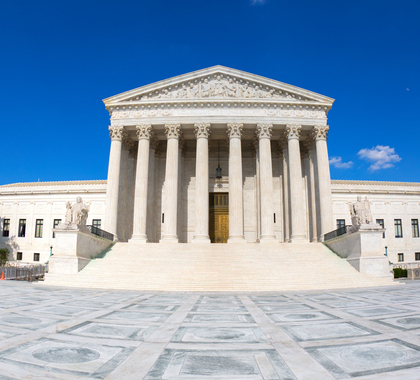A recent New York Times story, titled “A Polarized Supreme Court, Growing More So,” illustrates how left-of-center media distort perceptions of the U.S. Supreme Court.
The story’s problems begin with the lead paragraph’s assertion that Justice Neil Gorsuch’s appointment is “a conservative replacing another conservative.” What the Times probably intended to say is that the appointment replaces an originalist with an originalist. Originalism and conservatism are not the same thing.
Originalism is untied to political results, whether liberal or conservative. It applies the methods English and American judges have used for centuries to interpret most documents, including constitutions. The primary difference between modern originalists and non-originalists hinges on whether judges should be consistent or whether they should change the rules of interpretation for some hot-button constitutional issues.
In the article, as elsewhere, the Times describes the Court as split five-to-four, with the majority constituting a “conservative bloc.” It is more accurate to describe the Court as split four ways: (1) liberal activists (Elena Kagan, Ruth Bader Ginsburg, Stephen Breyer, Sonia Sotomayor), (2) originalists (Clarence Thomas and Gorsuch), (3) advocates of judicial deference (John Roberts, Samuel Alito), and (4) an erratic social libertarian (Anthony Kennedy).
“And, in a shift in recent years,” the Times writes, “partisan affiliation has become a very strong predictor of voting trends for all its members.” The sentence is technically true but substantially misleading. This description would be better: although Democratic appointees have been reliably liberal on most issues, Republican appointees have commonly slipped to the left—a slippage reduced recently as GOP administrations have adopted better vetting procedures.
The article’s thigh-slapper is its description of Kennedy as “a moderate conservative.” Anyone familiar with Kennedy’s judicial style knows that he is not a moderate anything, much less a conservative. It is true that he has voted to strike down some particularly ambitious pieces of congressional legislation, but he has also reaffirmed the very liberal view that the federal government may exercise almost unfettered control over the national economy. More importantly, he has written a series of opinions reaching radical social results through an untethered and virtually unprecedented methodology.
Similarly revealing are the “experts” the Times chose to quote. Apparently, there are no experts in flyover country or in the South. Everyone worth hearing is from the Northeast or West Coast. This is an extraordinary omission because the nomination of Gorsuch, a Coloradan, was widely viewed as an effort to rebalance the court toward the country’s center.
Neither do practicing lawyers exist in the Times‘ world. Everyone quoted is affiliated with an academic or policy institution.
Nor do consistent originalist experts exist—even though the Gorsuch hearings dwelt largely on originalism. The Times quotes four liberals and one activist libertarian. No originalist scholars at all.
The Times article cites just one case by name: Citizens United v. Federal Election Commission. The Times treats that case, as is common among liberal writers, as an unqualified “conservative” victory. In fact, it was a split decision, with originalists winning on one issue but losing on the other.
Several years ago, the Times was properly criticized for describing the Court’s activist liberals as its “four moderates.” While the latest article doesn’t make that mistake, it does reveal the Times‘ propensity for putting its left-of-center views at the hub of the ideological universe. Thus the reporter describes Obama appointee Merrick Garland as “not especially liberal.” And he selected for publication an unrebutted claim that Garland was “centrist.”
Yet the reporter’s own article shows this to be untrue. It includes another unrebutted quotation in which a long liberal wish list is described as “safe” with Garland. If he were a centrist, presumably liberals would lose sometimes!
In fairness, the Times does quote an expert who cautions against its stereotyped nomenclature—pointing out that labeling Gorsuch and Garland as “‘conservative” or “liberal” is “too simplistic and unfair to both of them.” That caution, however, is buried at the end.
[Originally Published at the American Conservative]




